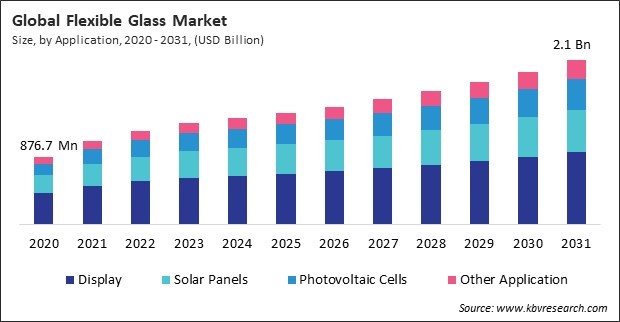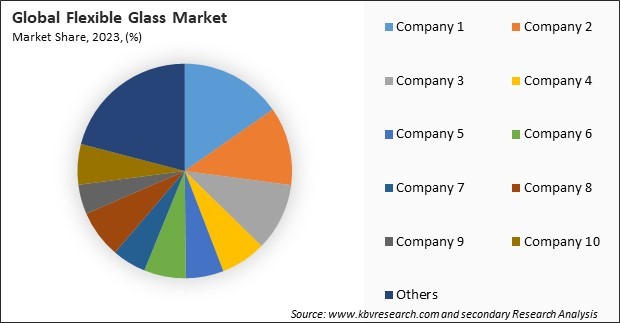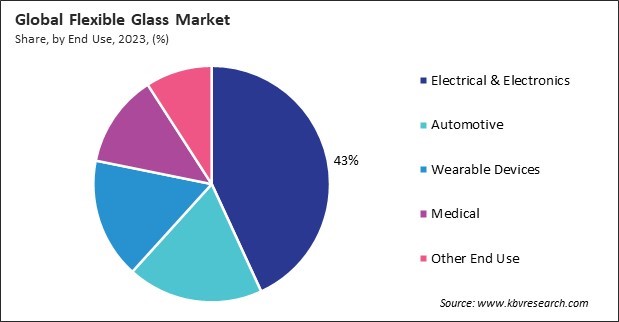“Global Flexible Glass Market to reach a market value of 2.1 Billion by 2031 growing at a CAGR of 6.4%”
The Global Flexible Glass Market size is expected to reach $2.1 billion by 2031, rising at a market growth of 6.4% CAGR during the forecast period.
The early adoption of innovative technologies in North America, including foldable displays and wearable devices, has accelerated the integration of flexible glass. Government support for green energy initiatives and the high purchasing power of consumers in North America also played a crucial role in the segment’s robust growth. Therefore, the North America segment garnered 30% revenue share in the market in 2023. The regional market is buoyed by a robust presence of prominent technology companies and a high demand for advanced electronic devices. A number of factors have contributed to the need for flexible glass, including the transition of the automotive sector toward electric and driverless vehicles, as well as large investments in efforts pertaining to renewable energy.

R&D investments address specific challenges, such as improving flexible glass's scratch resistance and thermal stability. These advancements make the material more suitable for high-performance environments, such as automotive infotainment systems and industrial IoT devices. Innovations are also driving the integration of flexible glass with other cutting-edge technologies, such as OLED displays and smart sensors, enabling the creation of next-generation products that cater to consumer and industrial demands. Additionally, the rising demand for flexible glass is also closely tied to manufacturers' ability to offer sleek, futuristic designs that stand out in the competitive consumer electronics industry. Flexible glass enables curved, edge-to-edge displays that enhance device aesthetics and functionality, aligning with consumer expectations for high-performance yet visually appealing products. Its ability to support innovative designs while maintaining durability and portability ensures that flexible glass will remain a cornerstone of this dynamic and rapidly evolving market. Hence, as the market continues to evolve, the role of flexible glass in meeting these consumer demands is expected to expand and the market is establishing a foundation for ongoing development as a result of the growing investment in research and development.
However, premium-grade raw materials, such as high-purity silica and specialized coatings, further increase costs. The need for precision in cutting, bending, and polishing adds to the complexity and expense of production. For industries operating on tight margins, such as consumer electronics or packaging, the high upfront costs of flexible glass make it less appealing, particularly when alternative materials like plastics can fulfill similar purposes at a fraction of the cost. As a result, flexible glass often remains restricted to niche applications where its unique advantages outweigh the costs. Hence, until advancements in manufacturing techniques reduce expenses or economies of scale come into play, the high costs will continue to limit its widespread adoption, especially in price-sensitive markets.

The leading players in the market are competing with diverse innovative offerings to remain competitive in the market. The above illustration shows the percentage of revenue shared by some of the leading companies in the market. The leading players of the market are adopting various strategies in order to cater demand coming from the different industries. The key developmental strategies in the market are Acquisitions, and Partnerships & Collaborations.
On the basis of end use, the market is divided into electrical & electronics, automotive, wearable devices, medical, and others. The electrical & electronics segment acquired 43% revenue share in the market in 2023. Flexible glass provides superior optical clarity, durability, and lightweight properties, crucial for modern display technologies like OLED and touchscreens. The increasing demand for innovative devices with foldable or curved designs has significantly driven the adoption of flexible glass in this segment. Furthermore, the increasing demand for thinner, more energy-efficient devices and the rapid expansion of the electronics industry, particularly in emergent markets, have further fueled its utilization.

Based on application, the market is classified into display, solar panels, photovoltaic cells, and others. The solar panels segment procured 27% revenue share in the market in 2023. Flexible glass's lightweight, durable, and transparent properties make it an excellent material for enhancing the efficiency and lifespan of solar panels. The rising adoption of flexible solar panels in portable energy systems, residential installations, and off-grid applications contributed to the segment's growth, as did government incentives and investments in green energy initiatives worldwide.
Free Valuable Insights: Global Flexible Glass Market size to reach USD 2.1 Billion by 2031
Region-wise, the market is analyzed across North America, Europe, Asia Pacific, and LAMEA. The Asia Pacific segment witnessed 40% revenue share in the market in 2023. The consumer electronics industry's accelerated expansion in countries such as Japan, China, and South Korea is the primary factor driving the segment. These nations are major hubs for producing advanced electronics, including foldable smartphones, laptops, and wearable devices, which heavily utilize flexible glass. Additionally, the region's strong manufacturing base and increasing investments in renewable energy projects like solar panels have further boosted the demand for flexible glass.
| Report Attribute | Details |
|---|---|
| Market size value in 2023 | USD 1.3 Billion |
| Market size forecast in 2031 | USD 2.1 Billion |
| Base Year | 2023 |
| Historical Period | 2020 to 2022 |
| Forecast Period | 2024 to 2031 |
| Revenue Growth Rate | CAGR of 6.4% from 2024 to 2031 |
| Number of Pages | 204 |
| Tables | 290 |
| Report coverage | Market Trends, Revenue Estimation and Forecast, Segmentation Analysis, Regional and Country Breakdown, Porter’s 5 Forces Analysis, Market Share Analysis, Company Profiling, Companies Strategic Developments, SWOT Analysis, Winning Imperatives |
| Segments covered | Application, End Use, Region |
| Country scope |
|
| Companies Included | DuPont de Nemours, Inc., LG Electronics, Inc. (LG Corporation), The Dow Chemical Company, Saint-Gobain S.A., Eastman Chemical Company, 3M Company, Mitsubishi Chemical Holdings Corporation, Sumitomo Electric Industries, Ltd., Saudi Basic Industries Corporation (SABIC), Toray Industries, Inc. |
By Application
By End Use
By Geography
The Market size is projected to reach USD 2.1 billion by 2031.
Rising Demand in Consumer Electronics are driving the Market in coming years, however, Substantially High Manufacturing Costs restraints the growth of the Market.
DuPont de Nemours, Inc., LG Electronics, Inc. (LG Corporation), The Dow Chemical Company, Saint-Gobain S.A., Eastman Chemical Company, 3M Company, Mitsubishi Chemical Holdings Corporation, Sumitomo Electric Industries, Ltd., Saudi Basic Industries Corporation (SABIC), Toray Industries, Inc.
The expected CAGR of this Market is 6.4% from 2024 to 2031.
The Display segment is leading the Market by Application in 2023; thereby, achieving a market value of $945.3 Million by 2031.
The Asia Pacific region dominated the Market by Region in 2023; thereby, achieving a market value of $868.3 Million by 2031.
Our team of dedicated experts can provide you with attractive expansion opportunities for your business.

 Drivers
Drivers
 Restraints
Restraints
 Opportunities
Opportunities
 Challenges
Challenges
